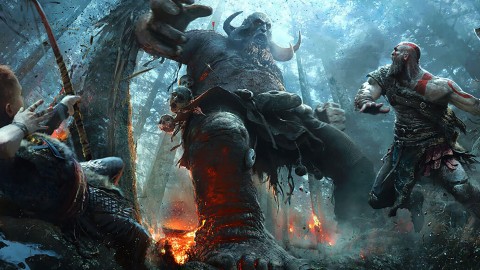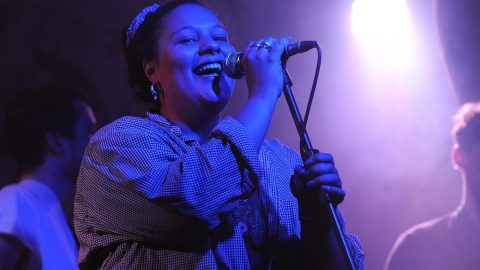
I was on a film set with Saoirse Ronan the day Donald Trump won the election. It was early morning on Wednesday November 9, 2016, and Ronan was in the middle of shooting a tough emotional scene for British period drama, On Chesil Beach. Surrounded by cameramen, costume designers, lighting technicians, extras, techies, makeup artists, publicists and 100 other people, everyone, including Ronan, was in an absolute state of shock.
Phones were checked in disbelief. Coffees were sipped in anger. Interviews barely ever got around to talking about anything else. Rage, sadness and utter confusion hung in the air. Leaving aside the fact that the new President of America was a lying, racist, sex offender – everyone in the room also knew that having Trump in the White House would have a real and lasting effect on the film industry.
Now that Trump is finally on the way out – as an army of migrant cleaners desperately try and scrub fake tan from the sticky leather sofas of the West Wing – we can look back over the last four years and see how far his stumpy orange fingers actually reached into the Hollywood pie. Doing a lot of damage alongside accidentally forcing through some real positive change, Trump’s legacy on film and TV is an odd, ugly story of deliberate mistakes and unintended consequences. Whatever Biden brings us in 2021, it’s unlikely he’ll have half as much of an impact on what we watch.

Repealing the ‘Paramount Decree’
Before 1948, movie studios ran the film industry like the mafia. Allowed to lock stars into airtight contracts, a handful of powerful men in Los Angeles ‘owned’ all the talent and used monopolies to control the entire distribution pipeline. If you ran an independent cinema in the ’40s, you had no chance of showing anything that anyone wanted to see because the studios built their own cinemas and showed their own films. All this changed with the Hollywood Antitrust Case of 1948 when the ‘Paramount Decree’ stopped studios from holding any exclusivity rights over who could screen their films. The studio system collapsed, Hollywood reformed itself, and a new golden age of independent film started to blossom.
Skip forward to 2019 and Donald Trump decides that things were better off the way they were. Instructing the Department Of Justice to repeal the Paramount Decree last November, the big studios are now eagerly waiting for a two-year termination period to end before they’re allowed to start muscling their way back into the distribution racket. Given the current state of the cinema industry, it’s hard to predict exactly what this will mean, but it’s likely to come at exactly the worst time for independent picture houses. If Disney, Universal, Netflix and Amazon start buying up struggling cinemas so they can screen their own films (or forcing them to ‘block book’ a catalogue of second-tier movies in exchange for screening something big), everyone loses. Just like any industry without any competition, prices will go up and choice will go down. With cinemas already on their knees, Trump’s intervention looks set to play a big part in keeping them there while the studios move in for the kill.

Annoying China
Until recently, Hollywood’s long-term plans all involved Chinese money. As America’s box office numbers started to plateau, the industry began looking at ways of milking the biggest and fastest growing audience in the world – tapping into the Chinese market with Hollywood movies that included enough Asian cultural nods to feel relevant (see Pacific Rim: Uprising, Rampage and Skyscraper). It wasn’t always an easy sell (especially given the Chinese government’s stance on homosexuality, Tibet or Winnie The Pooh…), but the massive river of yuan that started flowing into American bank accounts was proving hugely beneficial to the whole industry – helping studios have some of their highest ever tentpole grosses.
And then Trump came along. Throwing enough shade at President Xi Jinping over Twitter because he didn’t like paying taxes – before slapping $500billion worth of tariffs on imports in retaliation – Trump pissed off China so much that he sank the whole Hollywood international deal.
“This is like a blind, drunken bull crashing into a China shop,” Rob Cain, partner at Pacific Bridge Pictures and founder of ChinaFilmBiz.com, told NBC News at the time. “Things were already very delicate and fraught. The consensus is that this is catastrophic for Hollywood”.

Prolonging the virus
First blaming the coronavirus on China (that must have helped smooth over the whole import tax thing…), then deciding to ignore it completely, Donald Trump’s response to the 2020 pandemic has been criminal for plenty of reasons (237,000 and counting…), but his attitude to masks, social distancing and lockdown measures have directly affected the way the virus has spread. While it’s true that COVID-19 would have wreaked havoc on the world without him, Trump’s handling of the crisis in America has made it the most critically affected country in the world. For the film industry (which is largely based in America), the virus has been devastating, and the ripples have spread far and wide. With no major films being released in cinemas in Los Angeles or New York, UK chains have been forced to shut their doors – some potentially forever.
We blame Boris (quite rightly) for not stepping up to support the arts in the UK – giving millions to dodgy private Tory contractors instead of helping cinemas, music venues and theatres – but how much more to blame is Trump? How much could a better president have done to try and keep the film industry alive during 2020? How much of the damage caused by Trump’s anti-mask stance on the “Chinese virus” can really be undone? And how much will the US government now commit to supporting the arts in the aftermath?

Being a big old racist
“Liberal Hollywood is racist at the highest level, and with great anger and hate!” spat Trump on Twitter back in August, railing at political horror The Hunt, presumably without a shred of irony. Donald Trump might not be terrible at a lot of things but he’s always been an absolutely first-rate racist – with a whole Wikipedia page dedicated to his ugly views that has almost 500 separate citations in the footnotes.
It’s hard to pick from Trump’s most offensive opinions, but the one that had the biggest impact on Hollywood was the one that was hardwired into his original 2017 campaign – labelling all Mexicans as “drug dealers, criminals and rapists”, and promising to build a giant wall along the southern border to keep them out.
Since Hollywood had already spent years casting Mexicans as drug dealers, criminals and rapists (which is arguably where Trump got it from in the first place), filmmakers had to quickly rethink the way they portrayed minorities. After 2017, any film that features Mexican baddies became highly politicised – with films like George Clooney’s Suburbicon quickly rewriting scenes to be more sympathetic, and other’s like Sylvester Stallone’s Rambo: Last Blood leaning into the racism and drawing a thick Republican line in the sand.
Arguably, it was only during the Trump years that Hollywood started growing a social conscious – maybe realising for the first time what happens when someone who’s raised on a steady diet of Jean-Claude Van Damme movies gets any real power. Compare most mainstream films made today to those made four years ago and you’ll find them at least making an effort to appear inclusive – pushing (slightly) against the same racial and sexual stereotypes that defined Donald Trump’s Presidency.

Bringing back lynching
On May 25, 2020, the world looked on in horror as George Floyd was slowly murdered on the streets on Minneapolis. Except for Donald Trump, of course, who sent in the army to crack heads, asked The Proud Boys to “stand by” and tweeted a load of videos of Black men attacking white people. For anyone who had been listening to anything Trump said for the last few years, none of this was particularly surprising (check out his response to the Charlottesville rally violence in 2017), but his latest attempts to incite racial violence were so brazen that they helped fuel an entire global movement in Black Lives Matter.
In Hollywood, 2020’s summer of hate has had an even more direct result, calcifying what was only ever a half-arsed effort to support BAME film careers and promote on-screen representation, and instead forcing producers to try and make an actual difference.
Public statements were issued by every major studio. New commitments of inclusivity were signed-up to. People in positions of power actually started to rethink things. “Ahmaud Arbery, Breonna Taylor, George Floyd, all those deaths coming in quick succession — I think it’s opened up an entirely different conversation that particularly in Hollywood, coming in the wake of #MeToo, I think everyone is realising that the business has been built on some systemic wrongs that need to be righted,” Netflix vice president of original content Channing Dungey told Variety.
Crucially, even the portrayal of the police seems to have shifted dramatically – with little appetite left for hero-cop stories after one open-letter from the likes of Michael B. Jordan, Viola Davis and Idris Elba calling Hollywood to “divest from the police”. With even comedy shows like Brooklyn Nine-Nine now rewriting jokes to address police brutality, is it really plausible to expect another Bad Boys, Lethal Weapon or Die Hard?

Ruining ‘Home Alone 2’
As if Trump hasn’t done enough already, we have to remember him every Christmas when we watch Home Alone 2 – always hoping Macaulay Culkin suddenly spins around and hits him in the head with a paint can instead of letting him walk through his own paid-for cameo, somehow rewriting history and erasing the Trump Presidency before it even happened.
But what’s next? Now that we know that Donald Trump can’t do any more damage (or any more accidental good), it’s up to Joe Biden to try and fix his mistakes. With the virus still tearing though America and a world-wide depression on the way, the new President it likely to be pretty busy over the next few years – but by reversing the Paramount decision, patching things up with China and investing money in the recovery of the arts, Biden might just be able to turn things around for the film industry. And by being a force for good, instead of evil, he might even help change Hollywood for the better.
The post How Donald Trump changed Hollywood forever appeared first on NME Music News, Reviews, Videos, Galleries, Tickets and Blogs | NME.COM.







